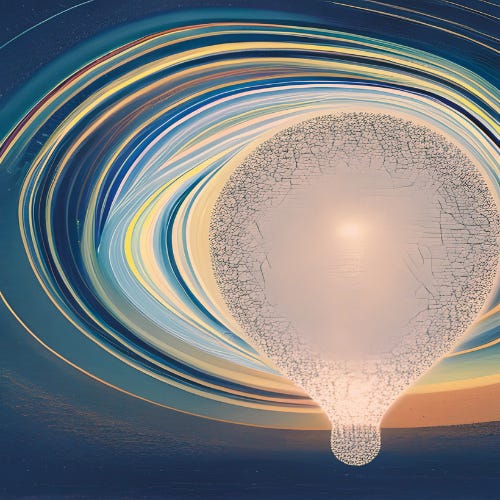Detachment Is Overrated If Misunderstood
Mindfulness myth #8
The past few weeks I’ve posted on the theme of disconnectedness. Whether words were spoken with no resonance in the shuddering well, or Lili pressed her grief back for fear of breaking down, it’s all about the false detachment that societal expectations, or our own fears push us to adopt.
False detachment.
Don’t religions and philosophy urge us to detach ourselves from the limitations of our human drives? Isn’t the nirvana supposed to become accessible only by relinquishing the world of our senses? Aren’t dignity, heroism, bravery, strength of character, and many other virtues an amazing feat of pulling ourselves away from fears, emotions, and vulnerability?
Houdinis unchaining ourselves from the turmoil of our hurt?
And then, there’s the Mindfulness Myths series I’ve been writing these six months. The last one I posted was about being present in the moment — and how it can easily be misunderstood (it’s about “myths”, you get it). I knew the next one should be about the myth of being detached, or absent.
There’s a Self and their Coach acting as protagonists in this series. They are supposed to show, more than tell, how mindfulness precepts, misunderstood, can do us more harm than good.
So let me just say that the Self is a bit tired of practising detachment, while the Coach has got a bit of a coaching burnout — as it often happens to anyone in real life. Don’t we all get fed up, every now and then, with self-improvement?
The Self picked up mindfulness advice about detaching oneself from what one feels, by labelling the emotion: this is anger, this is shame, this is longing and so on. Labelling involves distance, and recognition of where the emotion is coming from.
And the labelling can extend to situations: this is clinging, this is my ego, this is an abandonment syndrome, and then further on to other people: their ego is speaking volumes, they won’t let go, this is defensive behaviour.
It helps the Self make sense of her surroundings and manage her responses. But sometimes, she longs for fresh experiences that need no labels. There’s got to be something pristine that can’t be squeezed and sterilised by a name.
Surely there are other ways to gain detachment, too.
Apart from going to a desert. Keeping a lotus pose for hours. Chanting om in a temple. Holding back tears or compulsive laughter. Always checking both sides of the argument, staying neutral, objective, with a clear head. And all the rest.
The Coach should know. She might prescribe a different method to get detached.
The Coach, however, is having a day off. She’s painting tree bark as autumn decorations for her porch. She reads the Self’s message with a faint grimace.
If people took time for slow thinking, they wouldn’t need any more guidance. It’s the tossing and turning of the questions that matter — and the Self would know, if she took the time, that detachment is not gained by prescription.
“You want instructions? I’ll give you some,” the Coach mutters. There are manuals and illustrations by all those smart coaches.
Here we go.
So what?
Get the wrong detachment and you’re on track for misery.
“Right”, the Self cries out in the solitude of her hut, “thanks a million for the charts! If this is what detachment isn’t, enlighten me please on what it is, and how to get it!” The Coach is never didactic, what the hell?
She types and types and types — and stops. Goes back deleting, types back again.
The Self looks up, and out the window. She can see the Coach in the distance, painting some wood on her porch. She’s beyond any label, engrossed in her work.
She feels the tingle of her blood rush. She feels the heat. “It must be anger,” a thought pops up. “No need to tell me that, I feel it,” the Self replies.
The blood is slowing down, the chill of the November evening setting in.
“Was that it?” the Self wonders. “Do I need to be present, so I can gain detachment?”
My mother used to say, “Sit down a minute before you go.” Bags packed and loaded in the car, jacket on, handbag on the shoulder, I had to sit.
It did something. I might not have been always aware, but it halted the whirl I was riding on. It grounded me. I checked the ID, the wallet, the lipstick. I realised I needed to go to the loo. I contemplated briefly the journey ahead, and where it was taking me.
Pausing before we go. That might be the right kind of detachment.
Checking your roots again, checking the wave you’re on, checking where it might be taking you, and maybe realising how far you want to ride it.








Detachment is very often a flight response, maintained long-term, until it becomes a way of being.
I'm afraid the table doesn't display entirely in the email, unless you tap on it. In the app, it may prompt you to click to view it interactively on Datawrapper.